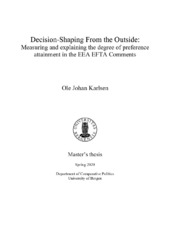Decision-Shaping From the Outside: Measuring and explaining the degree of preference attainment in the EEA EFTA Comments
Master thesis
Permanent lenke
https://hdl.handle.net/1956/23874Utgivelsesdato
2020-08-21Metadata
Vis full innførselSamlinger
Sammendrag
The membership of Iceland, Liechtenstein and Norway in the European Economic Area (EEA) has often been suggested to entail a democratic deficit. These three European Free Trade Association (EFTA) members have to implement a significant share of EU legislation without having representation in the EU institutions. Nevertheless, even without formal voting rights, they may be able to influence EU policy-making. In particular, the EEA agreement ensure the EEA EFTA States the right to be consulted on relevant issues. Accordingly, the three states frequently submit joint comments on policy issues, what is known as the EEA EFTA Comments. However, the importance of these comments, and more generally the EEA EFTA States’ influence on EU policy, has been generally overlooked in the literature. To start filling this important gap, this thesis aims to measuring and explaining the level success in the EEA EFTA Comments. Building on third country and interest group influence theory, I suggest an exchange model for the influence of the EEA EFTA States, expecting area-specific resources, issue controversy and the preferences of the decision-makers to determine preference attainment. To answer the research questions, the thesis employs a multi-method approach. I measure the preference attainment for 273 individual positions found in 80 comments submitted between 1995 and 2019 on draft legislative proposals, analyse the factors of preference attainment using logistic regression and complement my quantitative analysis with interviews with officials from the EFTA Secretariat and EEA EFTA States. The results show that the preferences are fully attained in 39.6 percent and partly attained in 18 percent of the positions. The regression analyses provide support for the hypothesised effect of area-specific resources, indicating that attainment is more likely on energy- and maritime-related issues. The thesis helps to understand the previously under-researched joint efforts of EEA EFTA States to influence EU policy-making.
